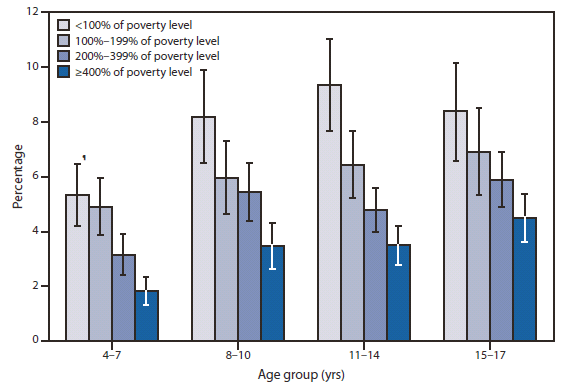Persons using assistive technology might not be able to fully access information in this file. For assistance, please send e-mail to: mmwrq@cdc.gov. Type 508 Accommodation and the title of the report in the subject line of e-mail.
QuickStats: Percentage of Children with Serious Emotional or Behavioral Difficulties,* by Age Group and Family Income Group† --- National Health Interview Survey,§ United States, 2004--2009

* Emotional or behavioral difficulties of children were based on parents' responses to the following question: "Overall, do you think that [child] has any difficulties in one or more of the following areas: emotions, concentration, behavior, or being able to get along with other people?" Response options were 1) "no"; 2) "yes, minor difficulties"; 3) "yes, definite difficulties"; and 4) "yes, severe difficulties." Children whose parents responded "yes, definite difficulties" or "yes, severe difficulties" were defined as having serious emotional or behavioral difficulties.
† Family income group is based on family income and family size using the U.S. Census Bureau poverty thresholds. Family income was imputed when information was missing, using multiple imputation methodology.
§ Estimates are based on household interviews of a sample of the U.S. civilian noninstitutionalized population. Denominators for each category exclude persons for whom data were missing.
¶ 95% confidence interval.
During 2004--2009, approximately 5.1% of all U.S. children aged 4--17 years were reported by parents as having serious emotional or behavioral difficulties. Across all age groups, poor children (i.e., those living in families with incomes <100% of the poverty level) more often were reported to have serious emotional or behavioral difficulties compared with the most affluent children (i.e., those living in families with incomes ≥400% of the poverty level). For example, among children aged 11--14 years, approximately 9.3% of poor children were reported by parents to have serious difficulties, compared with 3.5% of the most affluent children.
Source: National Health Interview Survey, 2004--2009. Available at http://www.cdc.gov/nhis.htm.
Alternate Text: The figure above shows the percentage of children with serious emotional or behavioral difficulties, by age group and poverty status in the United States during 2004-2009, according to the National Health Interview Survey. During 2004-2009, approximately 5.1% of all U.S. children aged 4-17 years were reported by parents as having serious emotional or behavioral difficulties. Across all age groups, poor children (i.e., those living in families with incomes <100% of the poverty level) more often were reported to have serious emotional or behavioral difficulties compared with the most affluent children (i.e., those living in families with incomes ≥400% of the poverty level). For example, among children aged 11-14 years, approximately 9.3% of poor children were reported by parents to have serious difficulties, compared with 3.5% of the most affluent children.
Use of trade names and commercial sources is for identification only and does not imply endorsement by the U.S. Department of
Health and Human Services.
References to non-CDC sites on the Internet are
provided as a service to MMWR readers and do not constitute or imply
endorsement of these organizations or their programs by CDC or the U.S.
Department of Health and Human Services. CDC is not responsible for the content
of pages found at these sites. URL addresses listed in MMWR were current as of
the date of publication.
All MMWR HTML versions of articles are electronic conversions from typeset documents.
This conversion might result in character translation or format errors in the HTML version.
Users are referred to the electronic PDF version (http://www.cdc.gov/mmwr)
and/or the original MMWR paper copy for printable versions of official text, figures, and tables.
An original paper copy of this issue can be obtained from the Superintendent of Documents, U.S.
Government Printing Office (GPO), Washington, DC 20402-9371;
telephone: (202) 512-1800. Contact GPO for current prices.
**Questions or messages regarding errors in formatting should be addressed to
mmwrq@cdc.gov.
 ShareCompartir
ShareCompartir


